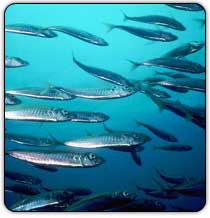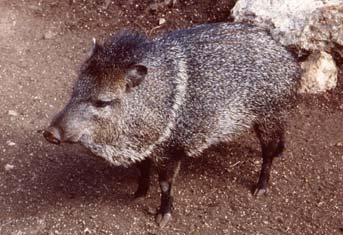 You thought this was a school of herring, didn't you? It isn't. It's an army.
You thought this was a school of herring, didn't you? It isn't. It's an army.I'm the last person to say that English has too many words: in fact, we don't have enough words, because,
as I have noted before, there are some conspicuous gaps in the vocabulary.
Sometimes, however, you run across a word list that makes you think, "Okay, that's just ridiculous." We'll get to that in a bit. But first things first.
From
today's "I Like to Watch" column at Salon.com, the following sentence:
The problem is, every time I register for the tour and plan to go, I start picturing terrible little hotel conference rooms with flocked, mauve and purple carpeting, filled with rows of uncomfortable chairs, staffed by overly enthusiastic publicists armed with stacks of xeroxed press releases about their crappy new shows for the fall season.I just don't think "flocked" is the right word for carpeting. Flocking is what puts the fuzz on a cheap plastic cat figurine, the pattern on some kinds of textured wallpaper, or the hair and beard on a G.I. Joe: it's the spraying of very short lengths of fibre onto a glue-coated surface to give it a nappy texture. Putting flocking on carpeting seems like a bad idea, because it would come off in short order; it's not as durable as you might hope. I'm not sure what Heather Havrilesky is getting at when she describes the carpet as flocked: did it have a three-dimensional nap like flocked wallpaper? Because if it is (it's the only thing I can think of), that's not flocked, it's sculpted, with different lengths of pile forming the pattern. (Answers.com says that "flock" can also mean "a tuft, as of fiber or hair": is this what she means? A tufted carpet?)
Anyway. I naturally looked up "flocking" on Answers.com because I was curious about the word's history, and was immediately sidestruck by a list of names for groups of animals, which I'm reproducing here in its entirety (until someone tells me to remove it), because it's just mind-bending.
The following related terms are used as indicated: bevy, a company of roe deer, larks, or quail; cast, the number of hawks or falcons cast off at one time, usually a pair; cete, a company of badgers; covert, a flock of coots; covey, a family of grouse, partridges, or other game birds; drift, a drove or herd, especially of hogs; exaltation, a flight of larks; fall, a family of woodcock in flight; flight, a flock of birds in flight; gaggle, a flock of geese; gam, a school of whales, or a social congregation of whalers, especially at sea; kennel, a number of hounds or dogs housed in one place or under the same ownership; kindle, a brood or litter, especially of kittens; litter, the total number of offspring produced at a single birth by a multiparous mammal; murder, a flock of crows; muster, a flock of peacocks; nide, a brood of pheasants; pod, a small herd of seals or whales; pride, a company of lions; rout, a company of people or animals in movement, especially knights or wolves; school, a congregation of fish, or aquatic mammals such as dolphins or porpoises; shrewdness, a company of apes; skein, a flight of wildfowl, especially geese; skulk, a congregation of vermin, especially foxes, or of thieves; sloth, a company of bears; sord, a flight of mallards; sounder, a herd of wild boar; stable, a number of horses housed in one place or under the same ownership; swarm, a colony of insects, such as ants, bees, or wasps, especially when migrating to a new nest or hive; troop, a number of animals, birds, or people, especially when on the move; warren, the inhabitants, such as rabbits, of a warren; watch, a flock of nightingales; and wisp, a flock of birds, especially of snipe.And hey--there are
lots more here! A husk of jackrabbits! A congregation of plovers! A spring of teal!
A filth of starlings!
I understand that we like to have different words to refer to different things: grapes, for instance, occur in bunches, and if, as in an old Peanuts cartoon, we refer to it as "a group of grapes", people will look at us funny, because it's wrong--it's unidiomatic. But do we really and truly need a special word for "a flight of mallards"--"sord", from the Latin "surgere", "to rise"--as opposed to flights of any other kind of bird? Why should a flock of crows be a "murder" while a flock of peacocks is a "muster"?
It's not just animals, either. I had an old old cookbook once that supplied a list of the correct terms, at least a dozen of them, for cutting up a piece of meat at the table: you carved a roast of beef, but disjointed a turkey and dismembered a pheasant, or something along those lines. I can't remember the specifics because (even to me!) it seemed so pointless and nitpicky, a way of distinguishing the people in the know, and with too much time on their hands, from the rabble. And that's how I feel about all those animal terms: if I say "a bunch of cats" instead of the approved "clutter" (an accurate enough term, I concede), what's the problem? I'm all for idiomatic phrases like "school of fish" and "bevy of quail", but there are limits, and when I'm expected to know that a batch of turtledoves is called a "pitying", I've reached those limits.




